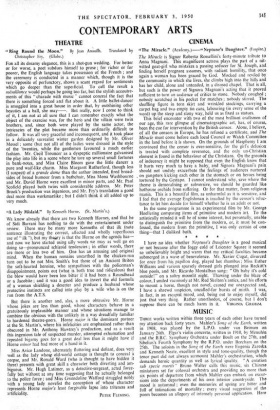CONTEMPORARY ARTS
THEATRE
FOR all its dreamy elegance, this is a shot-gun wedding. For better or for worse, a poet subdues himself to prose ; for richer or for poorer, the English language takes possession of the French ; and the ceremony is conducted in a manner which, though it is the very opposite of perfunctory, shows a scant regard for sentiments which go deeper than the supeificial. To call the result a mesalliance would perhaps be going too far, but the stylish accoutre- ments of this "charade with music" cannot conceal the fact that there is something forced and flat about it. A little ballet-dancer • is smuggled into a great house in order that, by outshining other beauties at a ball, she may—. But really, now I come to think of it, I am not at all sure that I can remember exactly what the object of the exercise was, for the herb and the villain were twin brothers, and, since both were played by the same actor, the intricacies of the plot became more than ordinarily difficult to follow. It was all very graceful and inconsequent, and it took place in a delicately surrealist winter garden designed by Mr. Oliver Messel ; some (but not all) of the ladies were dressed in the style of the 'twenties, while the gentlemen favoured a much earlier fashion. Mr. Cecil Trouncer as a dyspeptic millionaire galvanised the play into life in a scene where he tore up several small fortunes in bank-notes, and Miss Claire Bloom gave the little dancer a pure and waif-like charm. Miss Margaret Rutherford, though less (I suspect) of a grande dame than the author intended, fired broad- sides of broad humour from a bathchair, Miss Mona Washbourne and Mr. David Horne were excellent in minor parts, and Mr. Paul Scofield played both twins with considerable address. Mr. Peter Brook's production was ingenious, and Mr. Fry's translation a good deal more than workmanlike ; but I didn't think it all added up to very much.


































 Previous page
Previous page